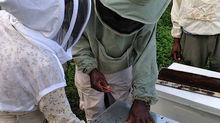National Expert on Natural Beekeeping to Visit the Rogue Valley
- Laura Bee
- Jun 4, 2015
- 4 min read

College of the Melissae; Center for Sacred Beekeeping
& Pollinator Project Rogue Valley presents
Jacqueline Freeman & The Song of Increase:
Returning to our Sacred Partnership with Honeybees
(Friendly Haven Rise Press, December 2014)
Join us for any or all
of our wonderful events and venues!
(See schedule below)
Jacqueline Freeman is a Biodynamic beekeeper and farmer, owner of Friendly Haven Rise Farm in
Venersborg, Washington, and a community swarm-rescuer. She teaches a variety of workshops on topics
that include natural beekeeping, growing pollinator gardens, biodynamics, swarm catching, and bee fertility.
For more information about Jacqueline: Friendly Haven Rise Farm (http://friendlyhaven.com) or The Song of Increase (http://spiritbee.com).
Local sponsors of Jacqueline Freeman’s visit include:
College of the Melissae, the Center for Sacred Beekeeping; Pollinator Project Rogue Valley;
the Oregon Honey Festival; Bee City USA – Ashland; Bee City USA – Talent; Bee Campus USA – Southern Oregon University; Jackson Wellsprings; EcoNest; Bellview Grange; Ashland Food Co-op, Oil is Well
SCHEDULE:
Discussion at Jackson Wellsprings Apiary
Wednesday, June 10, 9:00-noon
Greenhouse @ Jackson Wellsprings, 2253 Highway 99 N, Ashland
Cost: $20 ticket at the doorJ
Jacqueline Freeman and Laura Bee Ferguson will discuss community, spirituality, and beekeeping.
Natural and Treatment-Free Beekeeping Workshop
Wednesday, June 10, 2:00-5:00 p.m.
Where: EcoNest, 8993 Wagner Creek Road, Talent
Cost: sliding scale, $25-$40, pay at the door
Jacqueline will lead this workshop on best practices for natural and treatment-free beekeeping.
If you have your own beekeeping gear, please bring it.
Natural Beekeeping Lecture
Wednesday, June 10, 6:30-10:00 p.m.
Where: Bellview Grange, 1050 Tolman Creek Road, Ashland
Cost: $10 at the door or free entry with the purchase of The Song of Increase
Jacqueline will provide a lecture on natural beekeeping, read from her book, The Song of Increase, and sign
books. There will be snacks, music by Frank Bernard, and time to socialize.
Fundraiser/Friendraiser for College of the Melissae.
Thursday, June 11, 10:00-11:30 a.m.
Where: Community Room of Ashland Food Co-op, 300 N. Pioneer Street, Ashland
Cost: suggested donation $10 at the door
A chance to talk informally with Jacqueline, and coffee, tea, and brunch snacks
Honey Culture Radio
Thursday, June 11, 1:00-2:00 p.m.
Where? EVERYWHERE!: 89.5fm KSKQ (live-streaming and archived @ www.kskq.org)
Jacqueline will be a guest of Laura Bee Ferguson and will discuss her natural approaches to beekeeping.
Backyard beekeeping has been gaining popularity across the Rogue Valley, and one of the nation’s leading
experts on natural beekeeping will visit the Rogue Valley on June 10-11 for several events that include a
lecture, workshops, book signing, and fundraiser. Jacqueline Freeman’s book, The Song of Increase: Returning to our Sacred Partnership with Honeybees (2014), lyrically explores the lives of bees and how human lives can be enriched through a “sacred partnership” with bees.
In the past century, beekeeping practices have become increasingly complex as industrial and hobbyist
beekeepers have developed a variety of interventions designed to increase colony health. These
interventions include the widespread use of insecticides to inhibit mites, the use of artificial frames that
encourage bees to grow larger combs, and practices that discourage swarms. Freeman’s approach is radically different, and it promises both healthier colonies and a deeper human-bee connection.
Freeman argues that natural beekeeping is the best approach for reducing the threats associated with Colony Collapse Disorder. “Through my study of beekeeping practices,” Freeman explains, “I discovered that
organic beekeepers haven’t suffered the same unsustainable bee losses that have devastated conventional
beekeepers. We need to heed this lesson.” For Freeman, organic practices are an important beginning for
supporting colony health, but she also suggests a more visionary shift in beekeeping practices: “If we want
to protect our honeybees from the threats posed by Colony Collapse Disorder, we actually have to change
our relationship with honeybees.”
As one example of that change, Freeman describes the importance of bee swarms to colony health, a
subject that she will elaborate upon during her upcoming visit to the Rogue Valley. “Swarming is a unique
and miraculous event in the cycle of bee life,” Freeman explains, “and we need to allow it to unfold as
nature intends. When we accept the beauty and importance of bees’ natural swarming habits, it leads us to
different conclusions about how we can best support our bees.” Central to Freeman’s approach is the
practice of observing and “listening” to bees to learn more about their needs.
Laura Bee Ferguson, Director of the College of the Melissae, the Center for Sacred Beekeeping, is thrilled
that Freeman is bringing her expertise to the Rogue Valley. “Jacqueline has gained a national reputation for
her understanding of natural beekeeping and the humane handling of swarms and bees.” As Ferguson notes,in addition to Freeman’s leadership in the field of treatment-free beekeeping, she also provides a transformative model of the human-bee relationship: “Her practices are ground-breaking and visionary. In The Song of Increase, Jacqueline explains animal communication and provides a compelling argument that if we listen to bees, it is not just the bees that we may save, but also the human race.”
In the past year, regional efforts to support honeybees, wild bees, and other pollinators include the recognition by Bee City USA of Ashland and Talent as “Bee Cities” (Phoenix’s recognition is pending) and the recognition of Southern Oregon University as the nation’s first “Bee Campus.” In addition, in April, the City of Medford revised its codes to allow residents to keep up to three hives per residence. With the arrival of spring, Rogue Valley residents have been planting pollinator-friendly flower gardens, growing and seeking organic produce, and organizing for reductions in the use of harmful synthetic pesticides. Freeman is delighted by these efforts and looks forward to sharing her natural beekeeping practices with local bee-lovers.




































Comments